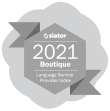Gain in-depth knowledge and perspective on various aspects and topics of translation and translation industry
There’s always this immediate question that comes to mind when debating translation quality: ‘How hard can it be to convey something from one language in another? It’s just equivalence, right?’ On the contrary. Translation may seem as straightforward an endeavour as bridging two shores or connecting two dots, while in reality translation and especially the achievement of a high quality translation is a highly challenging task.
Below we list several common challenges related to translation quality.
1. Disregarding Translation as a ‘lesser’ service
A quote by award-winning literary aficionada Ros Schwartz from the 2017 issue of The ATA Chronicle captures the translation process as ‘typing in another language’, an association that would imply translation is not something of such complexity as to require extensive effort or investment. At least from the potential buyer’s perspective.
But let’s consider a conglomerate such as Marvel Entertainment, whose films have achieved outstanding global presence, breaking cultural and linguistic boundaries as much as they break their box offices. Their rendition of Avengers: Infinity War in Korean was not only subpar in terms of translation quality, it downright led to outrage among its audience, who petitioned to get the translator of the film fired, delivering a heavy blow to the film’s Korean sales figures. Talk about disregarding translation quality and thinking you can get away with it…
2. "Cheaping out" on Translation resources
Along the same lines, ‘cheaping out’ on Translation costs is detrimental to ensuring high-quality translation output, as it implies employing inexperienced resources, who lack the necessary experience and expertise to deliver according to clients’ rigorous demands and expectations. And that is a first-hand indicator of lackluster translation output which can only weaken a brand or a business’s image and voice.
3. Tackling poor source texts
Besides the cognitive biases and human factors challenging translation quality, the linguistic aspect is equally decisive in how effective and pertinent a translation is to its target audience. The illusion of speeding up the process of translation by assuming the risks generated by poorly prepared source texts can not only result in inaccuracies or mistranslations, but also double the time and effort invested in the entire translation process, affecting turnaround for the businesses involved. Mistakes and inaccuracies in the source will lead to even more mistakes and inaccuracies in the translated version.
If you have a source text, like an instruction manual, check it thoroughly before translation to make sure everything is fully correct, especially considering that the source text will be used not only for the translations, but also included with the product for the English-speaking part of the world (assuming the source is English of course).
4. Opting out of third-party reviews and language quality assessments
To reach that sought-after level of quality, one must be ready to walk the tightrope between translation, editing, proofreading and continuously enhancing the text. So this is where the keen eye and sharp reflexes of a language quality assurance third-party reviewer are paramount to achieving pristine linguistic quality of your content based on international and industry-specific standards, approved term databases and style guides. So, opting out this key-performer (LQA) in the translation quality game is certainly not an option.
5. Staying too faithful to the source text
Jorge Luis Borges, in his typical eclectic literary fashion, is credited with a famous quote, ‘The original is unfaithful to the translation’. And so it should be, because what defines an impactful, high-quality translation is certainly not a tasteless, word-by-word rendition of platitude, but the power of a translation to remodel and reinvent the source text into the target linguistic spectrum. More often than not, a key challenge that hugely impacts the quality of translation is the poor, uninspired choice of keeping too close to the original source text, and not grasping the cultural background and nuances of the target language in which the message is conveyed.
All in all, there are certainly many more challenging benchmarks that a translation has to meet before being considered qualitative and relevant to the cultural backdrop it reflects or to the business identity mechanism it seeks to become a core element of.
At AD VERBUM, we certainly do not disregard translation as a lesser service, nor do we cut corners with the time and attention to detail we invest into each and every step of our linguistic processes.
Speak globally and pertinently with AD VERBUM’s top-quality translation services and excellent subject matter experts, and unlock new ways of overcoming the linguistic challenges your business may have.
References:
• Ros Schwartz in the November-December 2017 issue of The ATA Chronicle
• Article by John M. Millan, ‘Why Can’t I Raise My Rates? An Introduction to the Economics of Language Services’
• Article by Kali Faulwetter, ‘High-Quality Translation Philosophy with Jorge Luis Borges’

Translation service quality certified company.
Quality management system certified company.
Information security standard certified company.
Machine translation output post-editing quality certified company.
+371 6 7229 430



©2002-2024, AD VERBUM Ltd.


On 28.03.2024 AD VERBUM Ltd. signed an agreement No 17.1-1-L-2024//180 with the Investment and Development Agency of Latvia on receiving support for export assistance under the project “SME Innovative Business Development” co-financed by the European Regional Development Fund.